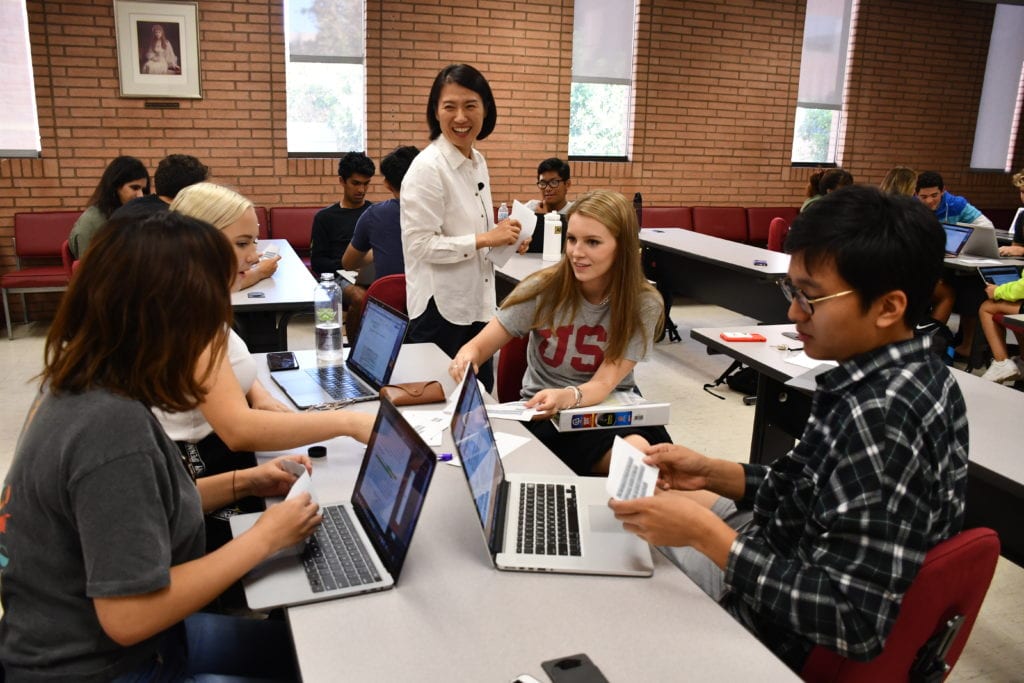Taking on the task of defining and illustrating what success looks like can seem incredibly daunting. However, Min-Kyoung Rhee and her cohort of freshmen have dared to explore such a profound and existential topic. In her freshman seminar, “Prosperity Across the Lifespan,” Rhee explores the diverse aspects of lifespan and human development at each stage from infancy to death and dying.
Rhee, an instructional assistant professor at the USC Leonard Davis School of Gerontology, researches the complexities of mental health disparities among ethnic minority immigrants, including older adults. A Trojan alumna, she completed her PhD at the USC Suzanne Dworak-Peck School of Social Work in 2013. Before returning to USC, Rhee served as an adjunct lecturer at Chung-Ang University’s School of Social Work in Seoul, Korea. She hopes that her freshmen can apply knowledge of development and prosperity to better understand their own prosperity throughout life.
“I wanted my students to understand that prosperity can mean different things to different people and to help them find their own unique definition of prosperity rather than a universal definition,” Rhee said. “While they included happiness, love, and financial stability as one of the pillars of prosperity, they also expanded the pillars to include access to equal opportunities, freedom, and spirituality.”
The Freshman Seminar Program, introduced in the fall of 2011, grants incoming freshmen the opportunity to tackle an engaging topic with a member of the USC faculty and a small discussion group comprised of their peers. Some seminars such as Rhee’s have tackled issues concerning the mind and body; other topics have ranged from musical subcultures to the post-Communist landscape and natural disasters. In 2013, University Professor Caleb Finch and Assistant Professor Jennifer Ailshire of the USC Leonard Davis School taught a similar gerontology-focused seminar investigating human longevity with the improvements made by modern medicine, hygiene and food preservation.

Min-Kyoung Rhee, instructional assistant professor of gerontology, explains a discussion assignment to students in GESM 131g, Seminar in Social Analysis: Prosperity Across the Lifespan.
“Although the course title itself was predetermined, I had plenty of room to redesign the course,” Rhee said. “Throughout the course development, I tried to focus on connecting the two key words: freshmen and prosperity. Freshman year in college is certainly an exciting time full of new experience–an opportunity to meet new people, learn, and grow. However, it can also be overwhelming and confusing at times.”
The class tackles the concept of prosperity from a multidisciplinary aspect, observing the ramifications of socioeconomic status and culture on a person’s perception of happiness.
Two weeks into the class, the students challenged themselves to establish a specific, measurable, achievable, relevant and timely (SMART) goal as part of their “Prosperity Project.”
Nicole Levi, a freshman in the class majoring in English at the Dornsife College of Letters, Arts and Sciences, said, “I feel that this class allows me to think about multiple aspects of prosperity and aging, rather than a limited view that I may have had before. Prosperity is typically thought of as wealth, at least in my experience, and this class does a good job of exploring other definitions and facets of prosperity.”
Through a combination of various group discussions and lectures, students learn about concepts such as theoretical perspectives on human development and the basic principles of lifespan human development.
“In the second half of the semester, students will focus on learning human development in middle and late adulthood as well as death, which are directly related to the field of gerontology,” Rhee said. “I hope students have opportunities to learn new perspectives about aging and gain valuable insights into how aging issues can be better addressed in real life for themselves and their family members.”
Students in the class come from all walks of life, bringing different experiences into the limelight as a means of understanding their personal definition of prosperity.
“The idea of getting old definitely seems farther away, but as I see my younger sister and friends grow up, I begin to realize the truth about getting older,” said Samarth Kamle, a freshman majoring in biomedical engineering at the Viterbi School of Engineering. “I took this class because it seemed like an interesting seminar on a topic that is pertinent to everyone: life.”
The class intends on reinforcing that prosperity can be achieved by people of all age-groups in various ways. Recently, the class discussed the multidimensionality of the human lifespan and created concept maps to demonstrate how prosperity seeps into every aspect of life.
“I’m very excited to hear their stories, which I believe will make all of us grow and be inspired from each other,” Rhee said. “I am very lucky to work with them through the process, and I really hope that they not only learn about prosperity but also feel prosperous.”





